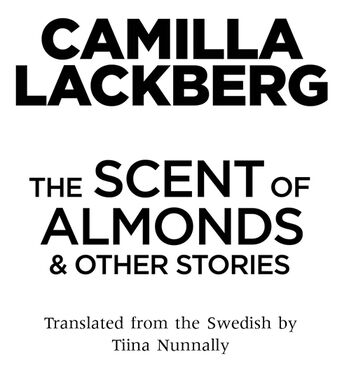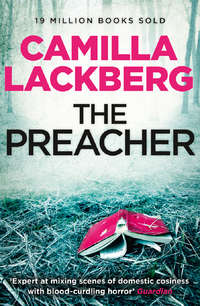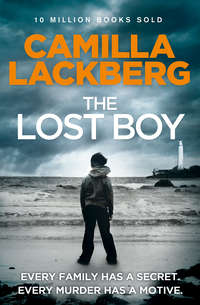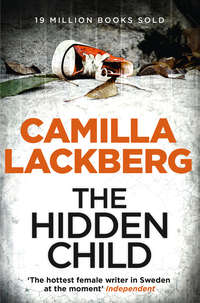
Полная версия
The Scent of Almonds and Other Stories



Copyright
Published by HarperCollinsPublishers Ltd
1 London Bridge Street
London SE1 9GF
www.harpercollins.co.uk
First published by HarperCollinsPublishers 2015
Copyright © Camilla Lackberg 2007
Published by agreement with Nordin Agency, Sweden
Translation copyright © Tiina Nunnally 2015
Camilla Lackberg asserts the moral right to be identified as the author of this work
Cover layout design © HarperCollinsPublishers 2015
Cover photographs © Shutterstock.com
A catalogue record for this book is available from the British Library
This is entirely a work of fiction. Any references to real people, living or dead, real events, businesses, organizations and localities are intended only to give the fiction a sense of reality and authenticity. All names, characters and incidents are either the product of the author’s imagination or are used fictitiously, and their resemblance, if any, to real-life counterparts is entirely coincidental.
All rights reserved under International and Pan-American Copyright Conventions. By payment of the required fees, you have been granted the non-exclusive, non-transferable right to access and read the text of this e-book on-screen. No part of this text may be reproduced, transmitted, down-loaded, decompiled, reverse engineered, or stored in or introduced into any information storage and retrieval system, in any form or by any means, whether electronic or mechanical, now known or hereinafter invented, without the express written permission of HarperCollins e-books
Ebook Edition © FEBRUARY 2015 ISBN: 9780008102081
Version: 2017-08-31
Table of Contents
Cover
Title Page
Copyright
The Scent of Almonds
An Elegant Death
Dreaming of Elisabeth
The Widows’ Café
About the Author
Also by Camilla Lackberg
About the Publisher
THE SCENT OF ALMONDS
Snow drifted through the air. Christmas was only a week away, and December had already racked up a record amount of snow and freezing cold temperatures. The ice had set in several weeks ago, but over the past few days a thaw had turned it brittle and unreliable.
Martin Molin was standing in the bow of the boat as it ploughed its way forward, following in the path forged by the coastguard cutter out to Valö. He wondered what he was doing here, and whether he’d made the right decision. But Lisette had been so insistent. To be honest, she had begged him to come. Family gatherings were not her strong suit, she’d said, and it would be much easier to bear if he were there to keep her company. The problem was that meeting her relatives implied a certain seriousness about their relationship that he, at least, didn’t feel.
But what was done was done. And what was said was said. Now here he was, on his way out to the old summer camp on Valö to spend two days with her family.
He looked back over his shoulder. Fjällbacka was undeniably beautiful, especially in the winter with the small wooden buildings nestled amid all that whiteness. And the way in which the little community was embraced by the grey mountain gave it a unique and aesthetically appealing air of drama. Maybe I should move here from Tanumshede, Martin thought briefly, but then laughed at himself. That would only happen if he won the lottery.
‘Toss me the painter, would you?’ shouted the man on the dock, startling Martin out of his reveries. He leaned down to pick up the line lying at his feet. When the boat got close enough, he threw it over the rail. The man easily caught the line and tied it to the bollard.
‘You’re the last one to arrive. The other guests are already here.’
Martin cautiously stepped down onto the slippery dock to shake hands with the man.
‘There were a few things I had to finish at the station before I could leave.’
‘Right. I heard that we were going to have a police presence out here this weekend. Makes me feel very safe.’
The man laughed and then introduced himself as Börje, the owner of the hotel.
‘My wife and I run the place. So I’m the carpenter, cook, butler and general handyman. All in one.’ Another loud, resounding laugh.
Martin picked up his bag and followed Börje towards the lights that could be glimpsed through the trees. ‘From what I’ve heard, you’ve done wonders with the old camp,’ he said.
‘We’ve put in a lot of work,’ said Börje proudly. ‘And money – I have to admit that. But now it’s doing well. The wife and I have been very pleased. We were actually fully booked all summer and well into the autumn. And we’ve been surprised to see that the Christmas special we’re offering has proved to be so popular.’
‘People like to get away from all the Christmas hubbub,’ said Martin, trying not to pant too much as they trudged up the hill towards the hotel. It was embarrassing; he ought to be in better shape, considering his age and his profession.
He took his eyes off the path and looked up, momentarily stunned. They really had done wonders with the old building. Like most people who had grown up in the area, Martin had come out to Valö on school field trips or to attend summer camp. He remembered a beautiful but somewhat run-down green building situated in the middle of an expansive lawn. Now the green paint had been replaced with white, and the structure gleamed like a jewel. From the windows streamed a warm light that made the white facade glow. Torches burned in front of the entrance, and through the windows on the ground floor he could see a huge Christmas tree. The whole place was incredibly beautiful, and he paused for a moment to take it all in.
‘Quite spectacular, don’t you think?’ Börje had also stopped.
‘Incredible,’ said Martin, and he meant it.
They went in through the main entrance and stomped their feet to shake off the snow.
‘The last guest has arrived!’ called Börje, his voice echoing down the hall. Martin heard quick footsteps as someone approached.
‘Martin! You’re here! It’s so good to see you!’ Lisette threw her arms around his neck, and again he had the feeling that he really shouldn’t have come. She was nice, and he found her attractive. Yet he was starting to think that she viewed their relationship as a bigger deal than he did. But it was too late for regrets. What mattered now was making it through the weekend.
‘Come with me!’ Lisette took his hand and more or less dragged him into the big room on the left. In Martin’s memories from his childhood, this had once been a dorm room crowded with bunk beds. Now it had been meticulously transformed into a living-room-cum-library. In the middle towered the giant Christmas tree, decorated according to the latest artistic trends.
‘Here he is!’ exclaimed Lisette triumphantly. Her relatives all turned to stare at Martin. He resisted an urge to tug at his shirt collar and instead gave a rather comical wave. When Lisette poked him in the side, he realized that something more was apparently expected of him, so he began methodically making his way around the room, moving from left to right. Lisette accompanied him so that she could introduce each person as they shook hands.
‘This is my father, Harald.’ A large man with bushy hair and an equally bushy moustache stood up to shake Martin’s hand with great energy.
‘And this is my mother, Britten.’
‘My name is actually Britt-Marie, but nobody has called me anything but Britten ever since I was five years old.’ Lisette’s mother also stood up to greet him, and Martin was struck by how alike the mother and daughter were. The same trim figure, the same nut-brown eyes and dark hair, even though Britten’s had quite a few streaks of grey.
‘How wonderful to meet you at last,’ said Lisette’s mother as she sat down.
Martin murmured something similar in reply, hoping the white lie wasn’t too obvious.
‘And here is Uncle Gustav,’ said Lisette. It was clear from her expression that this shorter and skinnier version of her father was not among her favourite relatives.
‘My pleasure, my pleasure,’ said Gustav Liljecrona politely, even offering a slight bow. Martin wondered if he was expected to bow in return, but decided that a brief nod would suffice. Gustav’s wife, who was the next person in line, also failed to evoke any genuine regard from Lisette, judging by her tone of voice.
‘My aunt, Vivi.’
Martin grasped a dry, shrivelled hand. A hand that was in sharp contrast to the woman’s face, which was so devoid of wrinkles that her skin seemed to be stretched as taut as the head of a drum. He was convinced that he’d see the traces of multiple surgical procedures if he tried to look behind her ears, but he managed to resist the impulse.
Clearly there was more familial affection between Lisette and the man sitting next to Aunt Vivi, since she announced ‘my cousin, Bernard’ with both warmth and joy. Yet Martin felt an instinctive dislike for the elegantly dressed man in his thirties. His hair was slicked back in the style that for some inexplicable reason was so popular among members of the financial sector.
‘So, this is Lisette’s policeman,’ he smirked, sounding like a real Stockholmer. Even though the statement was both correct and highly innocuous, Martin sensed that something else was lurking under the man’s nonchalant tone. Something derogatory, though he couldn’t quite put his finger on it.
‘That’s right,’ he replied, shifting his gaze to the young woman next to Cousin Bernard.
‘Bernard’s sister, Miranda,’ Lisette told Martin, who couldn’t help feeling startled as he took her outstretched hand. Cousin Miranda was breathtakingly beautiful. About twenty-five or so, with the same pitch-black hair as her brother, although her tresses were longer, and with dazzling blue eyes that she now fixed on Martin. For a moment he lost all focus. A slight cough from Lisette made him realize that he may have held on to her cousin’s hand too long, and he let go as if he’d burned himself.
‘My brother, Mattias. Although everyone calls him Matte,’ said Lisette with ice in her voice. Martin hurried to shift his attention to Lisette’s older brother. He had an open and pleasant face, and he shook Martin’s hand with enthusiasm.
‘I’ve heard so much about you. Lisette has hardly talked about anybody else since summer. It’s very, very nice to meet you finally.’
A dramatic pause followed, and then Lisette said:
‘Last but not least – Grandpa Ruben.’
Martin found himself standing in front of an elderly man seated in a wheelchair. Ruben had passed on his facial features to both sons, but over time he had shrunk to the size of a child. A checked blanket covered his lap and legs as he sat in his wheelchair. Yet his handshake was surprisingly strong, his eyes alert.
‘So … this is your young man,’ he said with an amused expression. Martin felt like a schoolboy standing before the headmaster. There was something extremely impressive about the old man, and Martin was familiar with his story. Ruben had been born as poor as a church mouse. From nothing he’d built an empire that today earned billions all around the world. It was a story that most Swedes knew.
‘Time for dinner!’ said a woman’s voice from the doorway, and everyone turned in that direction. A woman wearing an old-fashioned white apron stood there, motioning towards the dining room. Martin assumed she was Börje’s wife.
‘Good. I could use some food about now,’ said Harald, immediately heading for the table. The others followed close behind, and Martin watched with amusement as several family members rushed for Ruben’s wheelchair, battling to get there first. Lisette, who was the closest, emerged victorious, casting a triumphant glance at Aunt Vivi. Obviously there were some underlying family conflicts that he, the outsider, knew nothing about. Again he sighed. It was going to be a very long weekend.
Lisette felt the others staring at her as she pushed Grandpa Ruben’s wheelchair towards the dining room. Her successful effort made her cheeks flush, and she hoped that this minor victory was an indication of who would emerge the winner from the bigger battle: the one being fought over her grandfather’s money. Sometimes she felt almost dizzy at the thought of how much money would one day be hers. It wasn’t a question of millions, but rather billions of Swedish kronor. What mattered now was staying close to the old man and hoping that the others would make fools of themselves, one after the other – which wasn’t all that unlikely. She knew for a fact that her father and uncle were on the verge of burning their bridges; neither would prove much of an obstacle. Nor would Bernard and Miranda, for that matter. No, her strongest competitor for the inheritance was Matte. As things stood, she had to admit that he was her grandfather’s favourite. Even more than she was. But she was convinced that was only temporary. All she had to do was bide her time, and Matte would no doubt reveal some weakness that she’d be able to exploit.
‘Oh, I’m so sorry!’ She had just pushed the wheelchair into Martin’s shin, and she stopped to let him pass. For a moment she wondered whether it had been a good idea to invite him. But she’d been so determined to show her grandfather that she was now a mature adult, and having a steady boyfriend who also happened to be a police officer suited the image perfectly. Yet she wished Martin hadn’t behaved in such a clumsy manner when she introduced him to everyone. It took only one glance at Bernard to see what he thought of her boyfriend, and she suspected the others shared his opinion. Martin was a nice person, and very sweet, but it was obvious that he wasn’t exactly a man of the world. Well, she’d simply have to make the best of the situation in order to survive the weekend. She pushed her grandfather’s wheelchair into the dining room.
The sight of all the food piled up on platters on the sideboard was overwhelming. A vast array of mouth-watering offerings: ham, spiced pork roll, herring salad, pickled herring, meatballs, small sausages, and so on. Everything that anyone could want from a Christmas buffet, and Martin was embarrassed to hear his stomach growling loudly.
‘Sounds like the boy is hungry,’ laughed Harald, slapping Martin on the back.
‘You’re right. I suppose I am,’ he replied with a strained smile. He hoped to God that Lisette’s father wouldn’t make a habit of calling him ‘the boy’ and slapping him on the back.
A short time later everyone had filled their plates and then taken seats at the beautifully set dining-room table. Outside the window the snowfall had increased, turning into almost blizzard-like conditions. As Börje moved around the table pouring cold schnapps into everyone’s glass, he seemed worried.
‘It’s not looking good. According to the weather forecast, we’re in for a real storm. It may be difficult for anyone to reach the mainland if they have to,’ he said, nodding at the snow outside.
‘That won’t be necessary,’ said Ruben in his dry, old-man’s voice. ‘We’re not planning to go anywhere until Sunday, and we’re certainly not going to starve.’
Everyone laughed at his remark. A bit too loudly, a bit too heartily. A disapproving furrow appeared between Ruben’s bushy eyebrows. He’s probably sick and tired of everyone fawning over him, thought Martin. For a second they exchanged glances, and Martin realized that the old man was aware of what he was thinking. He lowered his eyes and focused on spreading a dab of mustard on one of the little sausages that curled up at either end. When he was a kid, Martin had called them ‘permed’ sausages, which was something his parents still reminded him of every Christmas when he visited them.
‘So, Bernard,’ said Ruben, shifting his attention to his grandson. ‘How’s the firm doing these days? I’ve heard a number of rumours lately.’
A few seconds of oppressive silence ensued before Bernard replied.
‘Nothing but spiteful gossip. Business is better than ever.’
‘Is that so? That’s not what I’ve been hearing,’ said Ruben. ‘And my sources – as you well know – are considered highly reliable.’
‘No offence to your sources, Grandpa Ruben, but I can imagine that they may not be in the thick of things any longer. So what would they know about …’
A sharp look from Vivi made Bernard fall silent. Speaking in a somewhat less aggressive tone, he said: ‘All I can say is that your sources are wrong. We’re going to show excellent results in the next quarter.’
‘And what about you, Miranda? How’s it going with your design company?’ Ruben’s eyes were as piercing as X-rays, and Miranda squirmed as she answered the question.
‘Er, well, we’ve had a bit of bad luck. A number of orders have been cancelled of late, and we’ve had to do a few jobs pro bono in order to establish customer references, and—’
Ruben held up his bony hand. ‘Okay, thanks, that’s enough. I get the picture. In other words, there’s not much left of the capital that I invested. Am I right?’
‘Um … well, you see, Grandpa, I was planning to talk to you about that …’ She twirled a strand of her lovely dark hair around her finger as she gave the old man an ingratiating smile.
‘The children are so clever and they work so hard,’ said Vivi, trying to rescue the situation. Tugging nervously at her pearl necklace, she babbled on: ‘Lately, Gustav and I hardly ever see them at home. They’re always working, working, working …’
The bits of sausage started to swell inside Martin’s mouth. The conversation had taken an unpleasant turn, and he tried to catch Lisette’s eye. Like the other family members, she was sitting at the table in tense anticipation, greedily following the exchange of words.
‘Any plans to start working sometime soon, Lisette?’
Lisette found herself stumbling for something to say as her grandfather suddenly focused his attention on her.
‘I’m … I’m … well, you know, I’m studying,’ she stammered nervously as she seemed to shrink in her chair.
‘Yes, I do know that,’ replied Ruben drily. ‘I’m the one financing your studies. And have been for eight years now. I wonder whether it isn’t time for you to put some of that knowledge into practice.’ His tone was deceptively gentle, but Lisette kept her frightened gaze on her lap as she murmured, ‘Yes, Grandpa.’ He snorted and then turned to his sons.
‘Having some problems at work, I hear.’
Martin saw Harald and Gustav quickly exchange glances. A wordless communication that lasted all of a second, but in that moment Martin was able to read both hatred and alarm.
‘What have you heard, Father?’ Harald said at last, accompanying the question with a big but superficial smile. It was his hands that betrayed his true feelings, manically tearing the napkin to shreds as he talked.
‘Everything’s going smoothly, as always. Business as usual, you know. Just like in your day.’
‘My day,’ grunted Ruben. ‘You know quite well that “my day” was no more than two years ago. You make it sound as if a hundred years has passed since I stood at the helm. And if I hadn’t developed these …’ he searched for the right words ‘… health problems, I’d still be standing there. But I have my sources within the company. And I’ve heard some things that are very disturbing.’ He shook his finger as he looked from Harald to Gustav.
Prompted by an urgent glance from Harald, Gustav cleared his throat and spoke. ‘As Harald said, everything is fine. I don’t know what you may have heard—’
Again Ruben grunted and saliva spewed from his mouth as he exclaimed: ‘What a sorry lot you are! All your lives you’ve been holding on to my coat-tails, spending my money, expecting to receive a silver spoon the minute you open your mouths! And against my better judgement I’ve given you countless opportunities. I’ve handed out more and more money for your enterprises, and I’ve allowed you’ – he indicated his two sons – ‘to take charge of my company, because I wanted so dearly to have the firm stay in the family. But you’ve all betrayed me! You’ve misappropriated and squandered and diminished everything I’ve ever given to you. And now I’ve had enough!’
Ruben slammed his fist on the table, making everyone jump. Martin knew that he should flee from this unpleasant situation he’d found himself in, yet he had the same feeling as if he’d happened upon a traffic accident. He just couldn’t tear his eyes away.
‘It’s my intention to disinherit every single one of you! I’ve rewritten my will, and it’s ready to be signed and witnessed. You’ll get no more than I am legally obliged to give you. A number of carefully chosen charities will thank their lucky stars, come the day I kick the bucket – because they’ll be getting the bulk of my fortune!’
The whole family stared at the man in the wheelchair. It looked as if someone had hit pause and frozen the tableau, because not one person moved. There wasn’t a sound in the room except for Ruben’s laboured breathing and the storm outside that now pounded like a wild animal on the windowpanes.
His outburst must have made Ruben thirsty, because he raised his water glass with a trembling hand and greedily drank every drop. Still no one spoke, no one moved. Ruben set down his glass, looking as if the air were slowly seeping out of him, like a punctured balloon.
A slight tremor in his face was the first warning that something was wrong, followed by a faint twitching on the right side, which rapidly moved to the left. Spasms began rippling through his body. To begin with they were barely noticeable, but they quickly intensified. A guttural sound issued from his throat, and then his whole, wizened frame started shaking as he sat in his chair. At that point the others reacted.
‘Grandpa!’ shrieked Lisette, throwing herself towards him.
Bernard also leapt to his feet, but both of them hesitated, unsure what to do. Bernard gripped Ruben’s scrawny shoulders, but the spasms were so strong that he couldn’t hold the old man still.
‘He’s dying, he’s dying!’ screamed Vivi, yanking so hard on her pearl necklace that the string broke and pearls cascaded all over the floor.
‘Do something!’ shouted Britten, looking around helplessly.
Martin rushed towards Ruben, but no sooner did he reach the old man’s side than the spasms abruptly stopped. Ruben’s body fell forward until his face landed in his plate with a nasty thud. Placing his thumb and index finger on the man’s wrist, Martin felt for a pulse, but after a moment he was forced to say:
‘He’s dead. I’m sorry.’
Vivi screamed again as she fumbled for the necklace, which was no longer in place.
Börje and his wife came running from the kitchen, and Harald shouted to them:
‘Ring the coastguard – we need an ambulance! My father has had some sort of seizure. We need to get help!’
Börje shook his head gloomily. ‘I’m afraid the storm has brought down the phone lines. I tried to make a call a little while ago, but the phone wasn’t working.’
‘Unfortunately, it wouldn’t make any difference,’ said Martin, getting to his feet. ‘As I said, he’s already dead.’
‘But what happened?’ sobbed Britten. ‘Did he have a heart attack? A stroke? What happened?’
Martin was about to shrug, to indicate that he had no idea. But then he caught a whiff of something in the air. A smell that seemed to hover around the old man’s place at the table. A smell that Martin thought he recognized. He leaned over Ruben, whose face was still resting among the herring and meatballs, and sniffed harder. Yes, there it was. Faint, but distinct. The scent of almonds. A smell that should not have been there. Martin reached for Ruben’s glass and held it up to his nose. The clear scent of bitter almonds rose to his nostrils and confirmed his suspicions.









